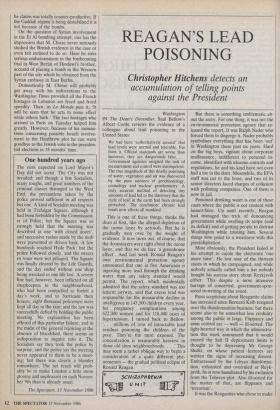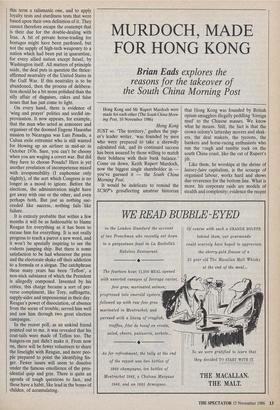REAGAN'S LEAD POISONING
Christopher Hitchens detects an
accumulation of telling points against the President
Washington IN The Dean's December, Saul Bellow's Albert Corde reviews the evidence of a colleague about lead poisoning in the United States:
We had been 'authoritatively assured' that lead levels were normal and tolerable. Far from it. Official standards are worse than incorrect, they are dangerously false. . . . Government agencies assigned the task of measurement and control were incompetent. The true magnitude of this deadly poisoning of water, vegetation and air was discovered by the pure sciences of geochronology, cosmology and nuclear geochemistry. A truly accurate method of detecting tiny amounts of lead led to the discovery that the cycle of lead in the earth had been strongly perturbed. The conclusion: chronic lead insult now affects all mankind.
This is one of these things, thinks the dean at first, like the alleged depletion of the ozone layer by aerosols. But he is gradually won over by the weight of evidence. It now turns out, of course, that the doomsayers were right about the ozone layer, and that we do face 'a greenhouse effect'. And last week Ronald Reagan's own environmental protection agency announced that one in five Americans is ingesting more lead through the drinking water than any safety standard would permit. The report, which incidentally admitted that the safety standard was too lenient anyway, said that excess lead was responsible for the measurable decline in intelligence in 143,500 children every year, for pregnancy complications among 622,000 women and for 118,400 cases of hypertension. I turned back to Bellow: `. . . millions of tons of intractable lead residues poisoning the children of the poor. They're the most exposed. The concentration is measurably heaviest in those old slum neighbourhoods. . . .' This may seem a rather oblique way to begin a consideration of a quite different phe- nomenon -- the gradual political eclipse of Ronald Reagan. But there is something emblematic ab- out the story. For one thing, it was not the environmental protection agency that re- leased the report. It was Ralph Nader who forced them to disgorge it. Nader probably symbolises everything that has been 'out' in Washington these past six years. Hard on the big boys, vigilant about corporate malfeasance, indifferent to personal in- come, identified with irksome controls and regulations, he and his kind have not even had a toe in the door. Meanwhile, the EPA staff was cut to the bone, and two of its senior directors faced charges of collusion with polluting companies. One of them is now in jail.
Poisoned drinking water is one of those cases where the public is not content with laissez-faire. Up until recently, Reagan had managed the trick of denouncing government while swelling its scope (and its deficit) and of getting people to distrust Washington while trusting him. Several things now point to a weariness with this prestidigitation.
Most obviously, the President failed in his attempt to cajole the electorate 'one more time'. He lost nine of the thirteen states in which he campaigned, and while nobody actually called him a liar nobody bought his success story about Reykjavik either. This despite a most intensive barrage of concerted, government-spon- sored re-writing of the event.
Press scepticism about Reaganite claims has increased since Bernard Kalb resigned over the disinformation business, but there seems also to be somewhat less credulity among the public at large. Flippancy and arms control are — well — ill-sorted. The light-hearted way in which the administra- tion this week announced that it would exceed the Salt II deployment limits is thought to be depressing Mr George Shultz, on whose patient features are written the signs of increasing dissent. Embarrassed by the Libyan disinforma- tion, exhausted and overruled at Reyk- javik, he is now humiliated by his exclusion from the Teheran plot. Also ill-sorted for the matter of that, are flippancy and `terrorism'.
It was the Reaganites who chose to make this term a talismanic one, and to apply loyalty tests and sturdiness tests that were based upon their own definition of it. They cannot therefore escape the contempt that is their due for the double-dealing with Iran. A bit of private horse-trading for hostages might have been pardoned, but not the supply of high-tech weaponry to a nation which had been put in 'quarantine, for every allied nation except Israel, by Washington itself. All matters of principle aside, the deal puts in question the thrice- affirmed neutrality of the United States in the Gulf War. If this neutrality is to be abandoned, then the process of delibera- tion should be a bit more polished than the silly affair of disguises, cakes and false noses that has just come to light.
On every hand, there is evidence of `wing and prayer' politics and sordid im- provisation. It now appears, for example, that the man who acted as armourer and organiser of the doomed Eugene Hasenfus mission to Nicaragua was Luis Posada, a Cuban exile extremist who is still wanted for blowing up an airliner in mid-air in October 1976. Sure, yciu can't be choosy when you are waging a covert war. But did they have to choose Posada? Here is yet another revelation of incompetence mixed with irresponsibility (I euphemise only slightly), of the sort which Congress is no longer in a mood to ignore. Before the elections, the administration might have got away with one or the other, and even perhaps both. But just as nothing suc- ceeded like success, nothing fails 'like failure.
It is entirely probable that within a few months it will be as fashionable to blame Reagan for everything as it has been to excuse him for everything. It is not really progress to teach a parrot a new word, and it won't be specially inspiring to see the rodents jumping ship. But there is some satisfaction to be had whenever the press and the electorate shake off their addiction to a formula or a slOgan. The catchphrase these many years has been 'Teflon', a non-stick substance of which the President is allegedly composed. Invented by his critics, this charge became a sort of per- verse compliment, like Tory, suffragette, supply-sider and impressionist in their. day. Reagan's power of dissociation, of absence from the scene of trouble, served him well and saw him through two great election campaigns.
In the recent poll, as an unkind friend pointed out to me, it was revealed that his Coat-tails were made of Teflon too. The hangers-on just didn't make it. From now on, there will be fewer volunteers to share the limelight with Reagan, and more peo- ple prepared to point the identifying fin- ger. Fewer 'issues will seem to dissolve under the famous emollience of the pres- idential quip and grin. There is quite an agenda of tough questions to face, and these have a habit, like lead in the bones of childen, of accumulating.



































































 Previous page
Previous page